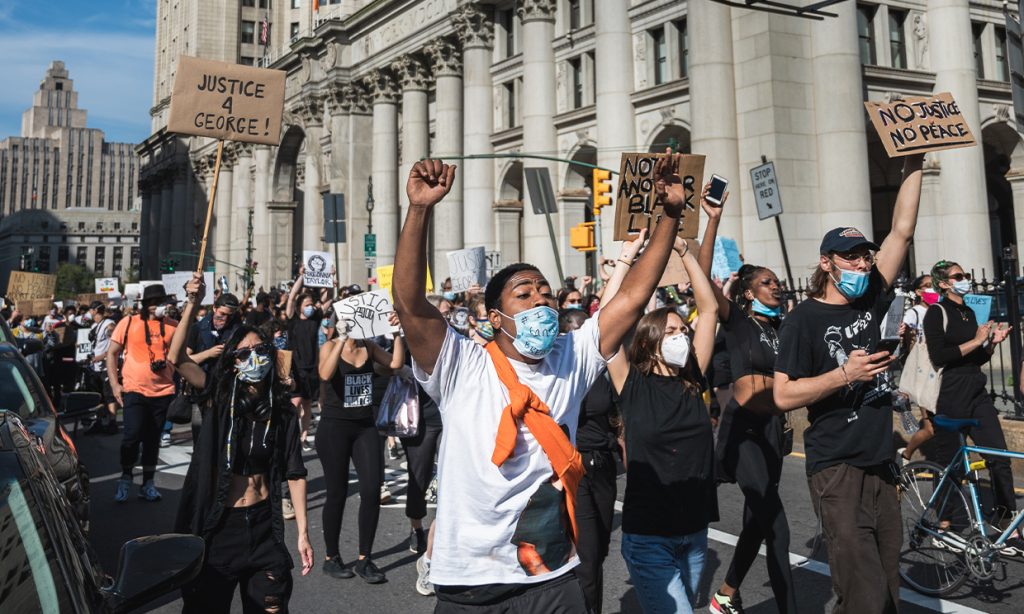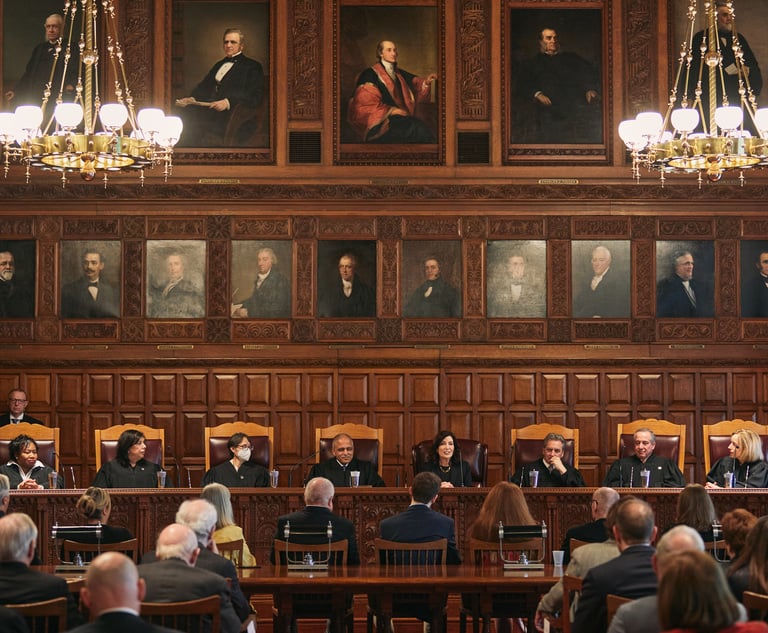Racism Is a Pandemic Inside a Pandemic
There is no peace without justice. And since before its founding, America has been driven by injustice.
June 11, 2020 at 11:15 AM
6 minute read
 Masked protesters marching in Manhattan, May 29. Photo: Ryland West/ ALM
Masked protesters marching in Manhattan, May 29. Photo: Ryland West/ ALM
We are living in a pandemic inside a pandemic. One is viral and the other is distinctly human. We are beginning to understand the former, but we seem further than ever from understanding the latter. Coronavirus, the novel corona, is terrifyingly impersonal; racism, America's original disease, is profoundly personal. Will we ever figure it out? Both pandemics ask of each of us: What does survival look like for me? The answer is different depending on your color.
I am a 55-year-old white male, a social justice lawyer, a husband and son and father. All aspects of my biography are challenged by racism. In this, I am not alone. There is no peace without justice. And since before its founding, America has been driven by injustice. But because our forebears were not brought here as slaves, white Americans can be blind to racial injustice.
However high silos of gold may appear to rise above the din and flames of rioting streets, we share a foundation. The more uneven the foundation, the shakier the silo. The rising tide lifting all boats is an illusion, but the inevitable flood of rage is real.
My father used to tell me and my brothers, "I'm glad not to have been born black or in the south." He didn't try to explain what that meant. He knew we had to figure race out for ourselves, just as he was trying to do. Over time, we took it to mean that he wanted to be neither oppressed nor oppressor. A skinny kid growing up in Brooklyn during World War II, he didn't know that he was channeling Lincoln. A wartime president who longed for healing, Lincoln feared both the master's boots and the slave's shackles. And yet today, after countless fathers have prayed that their sons be spared, after Father Abraham pleaded over a blood-soaked field for a new birth of freedom, America is enslaved and raging, half master and half slave.
"We are all in this together." If we mean them, those six words still seem to be our best chance of quelling coronavirus. A silent predator, it slips into our communities unannounced, lurking patiently but spreading voraciously mowing down the most vulnerable first while turning the less vulnerable into its agents, reaching deeper into the country. Only later did we learn that the pandemic advanced from both coasts at once, closing in on the heartland like rivers over broken levees.
Video montages of both pandemics look similar. When we see frontline workers protesting in France or Italy or Brazil, they sound like us, and the look in their eyes shows a common desperation. Last week, scenes from Minneapolis, New York, Philadelphia and Chicago also looked alike: irresistible forces and immovable objects. Collision after collision and in the wakes more tears and anger.
For brown and black Americans, where in the smoke and rubble is the Declaration and the Dream?
Next month is July, when we celebrate our nation's founding. In 1852, Frederick Douglass gave his famous "What to the slave is the Fourth of July?" speech. A full citizen, Douglas referred to the U.S. and its ideals as "your country" and "your political freedom." As much as he praised the promise of a revolution based on principles of justice and equality, he condemned how far we had already fallen. He rightfully loathed, mourned and railed against the betrayal of African Americans.
Speaking of and for the American slave, Douglas called July 4th "a day that reveals to him, more than all other days in the year, the gross injustice and cruelty to which he is a constant victim." In 2020, every day can feel like that for people of color across the country.
When Douglas gave his speech, the country was only 76 years old. We are not a young country anymore. How do we break the grip of a racist history that started long before we became a nation? Frederick Douglass summoned fire, thunder and storm to catch the nation's ear. Our streets now are full of fire, thunder and storm. Out of the broken promises and unfinished work, is something new rising? Not if it rises from brown and black Americans only. White Americans are part of history's grip. Are we listening? Are we acting?
These protests belong to the young. These streets are theirs. They are old enough to imagine walking them hand-in-hand with their own child, but young enough to believe they can straighten the path. And I believe in them. And I will join them.
Here's what I'll do. I will join in marches and protests. I will sit with my children, especially my sons, and ask them what they think, what their friends say, what their social media is carrying… and what kind of men they want to be. I'll take a stand when I hear a joke about race or a complaint that "all lives matter." And I'll step up in small ways, whether a sign on my lawn or seeking out and listening to my colleagues of color.
My generation has failed in so many ways. We did not survive The Great Depression, we did not win The Great War, we did not even aspire to a Great Society. We inherited the baton, fitted it out with technology, and took it towards Wall Street, towards consumption, comfort and chillingly slight regard for our own planet. We spawned more millionaires and billionaires than any prior generation; then left tens of millions gasping in our wakes, struggling to breathe like fish in an oxygen-starved lake.
As I mentioned, I call myself a social justice lawyer. There are many on the front lines fighting for equality under law, which I consider to be our greatest national aspiration, but I am not one of them. Before the pandemic, I fought my battles from the 38th floor of a glass tower not far from Wall Street. We do the best we can for others, but we put aside the lion's share for ourselves. There's nothing wrong with that, of course. But when I descend the elevator and walk out the glass doors, I shouldn't wonder why the streets are burning.
The pandemic will not just go away. Masks can only do so much. They protect by covering up. What we cannot share, we cannot heal. Are we really all in this together? Americans of color are already all in. How white Americans respond will determine how we survive together.
Kevin J. Curnin is a partner at Stroock & Stroock & Lavan in New York City and a founding member of the firm's Public Service Project.
This content has been archived. It is available through our partners, LexisNexis® and Bloomberg Law.
To view this content, please continue to their sites.
Not a Lexis Subscriber?
Subscribe Now
Not a Bloomberg Law Subscriber?
Subscribe Now
NOT FOR REPRINT
© 2025 ALM Global, LLC, All Rights Reserved. Request academic re-use from www.copyright.com. All other uses, submit a request to [email protected]. For more information visit Asset & Logo Licensing.
You Might Like
View AllLaw Firms Mentioned
Trending Stories
- 1Miami Attorneys Secure $4M Settlement Despite Insurance Limits
- 2NY Judge Admonished Over Contributions to Progressive Political Causes
- 3Legaltech Rundown: Alexi Launches an AI Litigation Tool, Hotshot Announces Private Equity Practice Courses, and More
- 46-48. It’s Comp Time Again: How To Crush Your Comp Memo
- 5'Religious Discrimination'?: 4th Circuit Revives Challenge to Employer Vaccine Mandate
Who Got The Work
Michael G. Bongiorno, Andrew Scott Dulberg and Elizabeth E. Driscoll from Wilmer Cutler Pickering Hale and Dorr have stepped in to represent Symbotic Inc., an A.I.-enabled technology platform that focuses on increasing supply chain efficiency, and other defendants in a pending shareholder derivative lawsuit. The case, filed Oct. 2 in Massachusetts District Court by the Brown Law Firm on behalf of Stephen Austen, accuses certain officers and directors of misleading investors in regard to Symbotic's potential for margin growth by failing to disclose that the company was not equipped to timely deploy its systems or manage expenses through project delays. The case, assigned to U.S. District Judge Nathaniel M. Gorton, is 1:24-cv-12522, Austen v. Cohen et al.
Who Got The Work
Edmund Polubinski and Marie Killmond of Davis Polk & Wardwell have entered appearances for data platform software development company MongoDB and other defendants in a pending shareholder derivative lawsuit. The action, filed Oct. 7 in New York Southern District Court by the Brown Law Firm, accuses the company's directors and/or officers of falsely expressing confidence in the company’s restructuring of its sales incentive plan and downplaying the severity of decreases in its upfront commitments. The case is 1:24-cv-07594, Roy v. Ittycheria et al.
Who Got The Work
Amy O. Bruchs and Kurt F. Ellison of Michael Best & Friedrich have entered appearances for Epic Systems Corp. in a pending employment discrimination lawsuit. The suit was filed Sept. 7 in Wisconsin Western District Court by Levine Eisberner LLC and Siri & Glimstad on behalf of a project manager who claims that he was wrongfully terminated after applying for a religious exemption to the defendant's COVID-19 vaccine mandate. The case, assigned to U.S. Magistrate Judge Anita Marie Boor, is 3:24-cv-00630, Secker, Nathan v. Epic Systems Corporation.
Who Got The Work
David X. Sullivan, Thomas J. Finn and Gregory A. Hall from McCarter & English have entered appearances for Sunrun Installation Services in a pending civil rights lawsuit. The complaint was filed Sept. 4 in Connecticut District Court by attorney Robert M. Berke on behalf of former employee George Edward Steins, who was arrested and charged with employing an unregistered home improvement salesperson. The complaint alleges that had Sunrun informed the Connecticut Department of Consumer Protection that the plaintiff's employment had ended in 2017 and that he no longer held Sunrun's home improvement contractor license, he would not have been hit with charges, which were dismissed in May 2024. The case, assigned to U.S. District Judge Jeffrey A. Meyer, is 3:24-cv-01423, Steins v. Sunrun, Inc. et al.
Who Got The Work
Greenberg Traurig shareholder Joshua L. Raskin has entered an appearance for boohoo.com UK Ltd. in a pending patent infringement lawsuit. The suit, filed Sept. 3 in Texas Eastern District Court by Rozier Hardt McDonough on behalf of Alto Dynamics, asserts five patents related to an online shopping platform. The case, assigned to U.S. District Judge Rodney Gilstrap, is 2:24-cv-00719, Alto Dynamics, LLC v. boohoo.com UK Limited.
Featured Firms
Law Offices of Gary Martin Hays & Associates, P.C.
(470) 294-1674
Law Offices of Mark E. Salomone
(857) 444-6468
Smith & Hassler
(713) 739-1250










